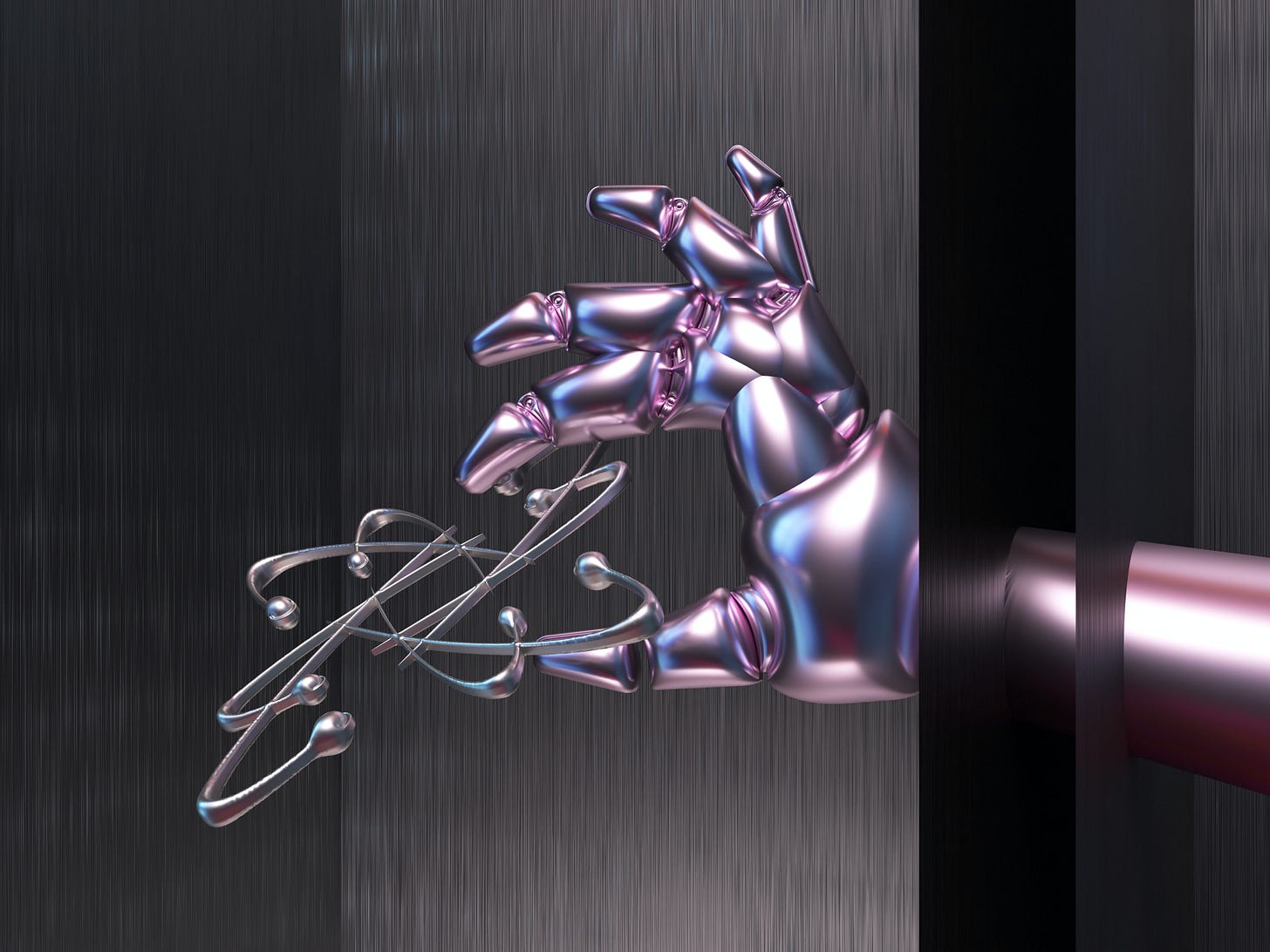untitled simulation theory
Disclaimer: This post contains speculative theory that does not necessarily reflect my true beliefs and I urge anyone reading it to do so with a hint of skepticism.
I love to theorize and contemplate the nature of reality. Grand fictions regarding the mechanistic workings of the cosmos, of everything that is, frequently occupy my mind, a guilty pleasure born of bizarre experience and an insatiable curiosity. These days, my theoretical evolution is sustained largely by recovery work, hinging on a connection to a power greater than ourselves, something hard for me to maintain without a reasonable level of conception. However, my days of serious metaphysical reverie began alongside a specific chapter in my history of drug usage; namely, a blatant obsession with stimulant drugs, particularly dextroamphetamine, fluorinated-phenmetrazine, and methylated-cathinone. I would strongly warn anyone against their usage; although, for a time, these potent drugs would supercharge the thinking capacity of my mind, expand my conscious perception and bring forth a wide range of wild theories, which I would spend countless hours handwriting out. Now that I am sober, it is slightly more difficult. Not only am I missing the grandiose belief in the validity of such theories that comes along with abusing said drugs, but my brain is running at a far more normal speed, and still healing, an adjustment well worthwhile.
There is value in crafting novel hypotheses outside the container of already developed theory. Professional researchers typically build upon the specialized work of others, which is built upon more specialized research, and so on. This vertical hierarchal approach comes with a major risk; if there happens to be a critical and fundamental error in the base of the epistemological pyramid, derived knowledge could be rendered invalid or even detrimental. An alternative approach is to garner the most rudimentary relevant building blocks and assemble a unique, unadulterated path, from the ground up.
I inadvertently discovered this virtue during my (still-ongoing) journey through graduate school. Naïve and venturous, I was thrust into a complex and highly-mathematical field of science—the study of multiphase fluid dynamics in pipes—where the bulk of published journal papers were far too dense for me to understand, at least without weeks of inquiry and derivation. Ultimately, I utilized the power of analogy, applying an obscure course-example of ideal flow, a simplistic tool used to demonstrate basic fluid dynamic concepts using fundamental conservation principles, to a far more complex real-world phenomenon called bubble centring. This allowed me to create a model that captures and predicts this occurrence—the first of its kind—and after nearly three years of grueling work, I published a novel theoretical study, passing two rounds of relentless peer-review from four established authors.1
Similarly, during the aforementioned often sleepless days of manufactured mental stimulation, I constructed various theories without any expert knowledge or exposure to existing works. The profundity of analogous investigation is boundless; for example, my past experience as a reservoir engineer, where I modelled the flow of hydrocarbons from an underground reservoir, through drilled wells, into production pipelines, gave me insight usable in generating a coherent conception of our reality, one that views human existence as a complex, organic simulation, run for the benefit of some higher-intelligence entity.
Simulations are conducted with a certain goal or set of outcomes in mind. In reservoir simulation, one hopes to predict the oil production of a field of wells, done by tuning a computational model to match historic data which can then be used to forecast future deliverability. Thus, if we are indeed living in a simulation, the entity it is that is simulating us—be it God or a sentient engineer—wants to know something as a result of their work.2 This fits well with the concept of the soul. Many spiritual circles ascribe to the idea that the soul inhabits a body in physical form in order to evolve and grow. The soul would connect the higher world, where the simulation takes place, and here, the simulated world. By our standards, this is remarkably sophisticated. If we assume that the soul is an inherent part of this higher-realm existence, then the simulation is involving its maker explicitly, somewhat similar to what virtual reality is tending towards in our own world, but magnitudes of complexity beyond it.
Think about outer space—the infinitely large abyss of mostly void space that exists beyond the limits of our planetary atmosphere, sprinkled with seemingly empty and barren planets. Humanity has found a way to explore a tiny fraction of space, both visually and physically, using advanced telescopic methods and aeronautics, an endeavor which may, under the assertion of a simulated reality, be underlyingly meaningless, akin to exiting and navigating the boundary of a first-person video game. Figments of space would only need to be simulated if we reached them, a clever but cruel design to save computational power.3 We are incentivized to explore space through a natural curiosity, which keeps us not only preoccupied but also constantly evolving as a species, an obvious objective of the hypothetical simulation. Within this narrative, the big bang theory could be seen as a storyline, not necessarily untrue but fabricated to divert our attention from the true nature of our being, meant for us to find and study, an endless line of carrots on a proverbial stick.
One of my earliest addictions was playing video games, and one series in particular that I gave a massive amount of time to was Halo. I remember online players uniting to discover ways of glitching their virtual bodies out of the designated playing grounds, finding a vast and amusingly strange world to be probed, something with an unnerving sameness to space exploration. The developers made it so on purpose—there were secret artifacts planted throughout this outer world for users to find—and once they had mastered the standard world of Halo, they could push themselves beyond it into a totally new adventure, one that was ultimately fruitless.4
Consider next sleep—a time for our body to recharge and regain homeostasis. This would be an ideal moment for our gathered experiential data to be uploaded and a chance for our perceivable reality to be updated, based on some guiding objective function.5 If I were designing this simulation, I would have an incessant need to periodically back-up the generated information, and to ensure that the simulation parameters remain relevant and optimizing. What better way to do that then by having the subjects intermittently shut down? Think about the alternative; intuitively, one would think that over millions of years humans would have evolved to sleep far less or not at all, if their function was purely their own. Instead, we have no choice as to whether we sleep or not. Recall just how terrible you feel after missing even one night of sleep. From the sensations that occur in its absence, we are compelled and motivated to sleep regular hours.6 Then there’s the concept of astral projection—the purposeful act of leaving one’s body upon the edge of wakeful-sleep—somewhat reminiscent of the forge-mode in Halo, where a little flying machine travels gracefully across the map to perform systematic alterations.
A final point of discussion is my favorite mathematical equation, called the Euler equation, an exquisitely simple and elegant relationship between the five most important numbers: e, the natural logarithmic, an irrational number which is found everywhere in nature, π, another irrational that is the foundation of our world’s geometry, 1, representative of something in binary, 0, nothing in binary, and finally i, the imaginary number, defined as the square root of -1, which is used widely in electrical engineering and basically accounts for all of the bugs in our system.7
This equation is immutable—demonstrably factual, proven by mathematical derivation and logic, a statement of absolute incredibility. It is almost too perfect to be true and for whatever reason has always reminded me of simulation theory. To have all five of these numbers be immaculately related as they are seems implausible without some intelligent input. I could totally envision some sentient lifeform deciding on the beautiful Euler equation, along with others, to dictate the happenings in our worldly simulation.
Once again, I am not implying that this is strictly what I believe to be true—truthfully, my views about the world are fluid and ever-changing. It is almost impossible for me to believe anything absolutely other than the raw flow of sensory data, past and present, crossing through the lens of my consciousness.8 Some of my experiences, particularly those involving psychedelic substances, have left me with memories hard to consolidate; for example, seeing the metallic and foreign emptiness of geometric space around me, physical objects that are typically rendered completely gone, a blank canvas-like frame in their absence, or the times when I met and interacted with a throng of identical Mr. Smith-looking men on large doses of an LSD-analog. Psychedelic drugs, also called entheogens, are said to thin the veil between us and our genuine reality.9 Maybe they are God-given gifts, esoteric by design and meant to bring about enlightenment in those who consume them in a healthy manner (which I rarely did).
Oftentimes in my theoretical ramblings I find there to be far more questions than there are answers. The idea of being a moving piece of some advanced otherworldly experiment may be disquieting, but if it were to be true, wouldn’t you want to know? Would it change the way you live out your life? Perhaps most importantly, what exactly would our engineer be trying to learn?
If anyone happens to be interested, you can find the pre-print version of my published paper through this link.
What is the difference? Our God could be a higher world’s working class engineer, or even better, graduate student.
Regarding simulation design, the alternative to our present planetary model where space extends infinitely outwards, would be a closed system, basically a big box that has solid, unbreakable boundaries. This model would be deleterious—people would feel inherently trapped, claustrophobic, and we would be unlikely to prosper. There would be no doubt that we are in some sort of experiment, without the space-theories to be followed, and researchers certainly don’t want their data to become self-aware, lest it introduce a whole host of bias.
Imagine Master Chief, the main character of the Halo series, as a conscious, thinking being: I wonder if he ever thought to realize that he was in fact a creation, made to entertain young people lounging on their couches.
Admittedly, I have had this type of experience during my days of psychedelic usage. My perceivable reality would change daily based on my experience and needs, not only on the days I was taking psychedelics but any given day between.
Sleep deprivation is a big part of my addictions history, enough so that an entire post could be devoted to it. Things get weird when you don’t sleep for days on end.
This is, of course, a broadly sweeping generalization and i has a deeply rooted place in mathematics and engineering. For example, there is an entire subfield of mathematics devoted to the study of functions that feature i, known as complex analysis.
I believe this notion is somewhat similar to what Ken Wilber refers to, in his audio series The Future of Spirituality, as absolute and relative truths.








